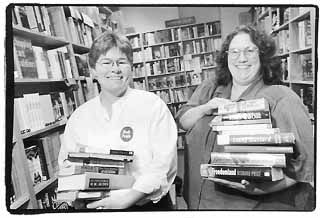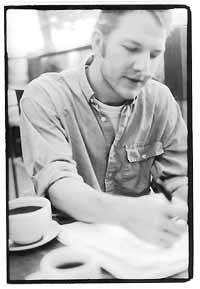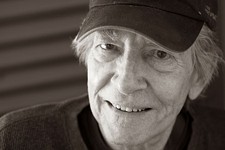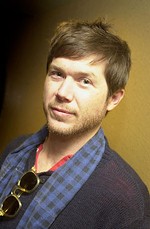Point of Sale
By Clay Smith, Fri., Oct. 9, 1998
|
|
Kirk Lynn and Kerrie Loyd sell books for a living, but they don't ring up customers' purchases. They don't direct customers to any particular section of a bookstore, although they're paid to know exactly where those sections are and why they're there. They don't share their thoughts with customers about a bookstore's most recent additions to its bookshelves, but they could probably rattle off those books' contents if asked. Kirk Lynn and Kerrie Loyd, both of whom live in Austin, are sales representatives of the publishing industry, unseen movers in a business environment where issues of display -- where decisions about which books are really going to be noticed and which are not -- are vitally important in determining an author's financial fate and in defining a bookstore's identity.
At Book People, which has almost 900 sections, head book buyer Tracey Tarlton points out the "whale," a large, tiered structure for displaying books near the checkout line. "When we're buying, we think this would be a great book 'on the whale' for Christmas and it will sell because it's out there and people will see it. It may be a book that if we put three of them back in a section somewhere instead of 20 in a stack on the whale, nobody would buy any of them." That's where publishers' sales reps come in. Tarlton explains that "the catalogs are arranged in such a way that the books at the front with full pages, those are the ones that [the publishers] are really trying to push and the reps can come in and" basically advise a store to steer away from buying books that aren't a good match for the store. Peggy Hailey, another book buyer at Book People, says that "it is nice to have someone that you can ask when the catalog doesn't tell you what you want -- what's the print run on this, how many of these are you printing, how behind this book is the company?"
Kirk Lynn recalls a bookstore owner just beginning to set up shop in Oklahoma "and she was just going hogwild with one of our presses and I had to just stop her and say, 'You don't actually want this many books. Where would you put them?' That's really the job. But we want to sell as many books as we can and the presses want us to." Kerrie Loyd emphasizes a slightly different take on the job: "Once in a while, when there's an important book that you have to get out those advance numbers on -- like it's priority to the house for whatever reason -- I'll say to Tracey, 'I need you to take 20 of these and even if you don't think you can sell all of them, I'll get you back some other time, I'll comp you some books; I'll owe you. That's how it really works."
|
|
Kerrie Loyd, however, is a house rep; she sells books in Texas, Oklahoma, New Mexico, Kansas, and Missouri for HarperCollins and only for HarperCollins. After graduating from the University of Texas in 1993 with a degree in journalism, Loyd knew she would have to move to New York in order to enter the world of publishing, where she started out as a marketing assistant at HarperCollins, moved to one of HarperCollins' imprints, Basic Books, then became a sales manager, and last year moved back to Texas to become a sales rep. Loyd also garners a base salary but works on a net commission on the books she sells, so that if a bookstore orders 50 copies of any HarperCollins title and sells only 25 copies and, as is standard, returns the unsold 25 copies to the publisher for credit, Loyd makes a commission only on 25 copies. Consequently, it's in her best interest not to sell more copies of a book than she thinks the bookstore will actually sell.
For sales reps, the key is knowing at any particular bookstore what books will sell and what books won't. "And you've got to tell them the truth," Loyd says, "if something isn't. That's what a lot of reps don't do -- they just try to sell everything and so you don't have any credibility with your buyer if you say, 'This is great, trust me, you're going to sell 20 of this,' and you know that they're not. There's only so many favors you can call in." Calling in favors and overselling and knowing the market -- terms any salesman is familiar with, but selling books isn't quite like selling anything else. (Lynn acknowledges that he never really "imagined being a salesman at all, even for books, but I can't imagine selling shampoo. ... How excited can you get about shampoo, even if you really care about beautiful hair?") Sales reps are expected to know their product, and so reading forewords, first chapters, table of contents, and entire advance copies of books when they're available is part of the job. HarperCollins sends Loyd "whatever they have, whether it's an introduction or a table of contents, but I try to look at everything and then I read the big house books that I need to be able to talk about and I read the stuff that I like."
"The Jim Hightower book -- There's Nothing in the Middle of the Road but Yellow Stripes and Dead Armadillos -- I don't think it was finished when it was being sold, but it was easy enough because people know him here and they love him and they know what to expect. And then sometimes you just kind of fake it, you know? But you never lie. You trust other reps who have seen material. Most people are doing this because they really love books and love literature and love reading so you trust people when they say it's good." Hightower's book may not have been finished when Loyd began selling it to book buyers, but sometimes a book hasn't even been written when she's out talking it up. "You can sell by the name of the author, like I can go to a bookseller and say it's the next Barbara Kingsolver. But if a book's not written, you can't be very effective in trying to sell it. The important thing is to have read at least a piece of it so that you can talk intelligently about it."
Lynn Bender, who owns Desert Books, opened Europa Books, and was once the head buyer at the University Co-Op, doesn't necessarily value sales reps for their insight into upcoming books. "When I first got into the book business I had the erroneous assumption that how a sales rep could help you was by explaining the books that you didn't know to you. I didn't know, I didn't realize that it was their ability to communicate or intercede with the presses that was going to be their greatest asset. In the beginning, it was very difficult for me and that was when I was hoping some of these reps would visit me because it's a new store; I'm way undercapitalized, I really need these guys' help ... you know, two months, three months, no telephone call. ... Meanwhile, I'm talking with the sales managers [at the publishing houses]. I manage to open accounts with everybody, pre-pay most of them, and a lot of times if the sales reps say these are good guys, the press won't make you pre-pay an order. Most of the time. Like if Kirk Lynn goes to University of New England Press, hands them an order with my credit letter and says, 'I know this guy, he's solid,' they're not going to ask me for pre-payment on the first order."
For Bender, a "great book buyer is somebody who knows who his customers are and makes the customers happy and yet makes a profit for the people he works for." The reason book buyers from Book People and Desert Books talk about these ideals is because they're buying books all the time and because they in particular say they love what they do. But for chain bookstores like Barnes & Noble and Borders, book buyers are located in the corporate headquarters and buy books for all of a chain's stores. Any particular Barnes & Noble or Borders location can create its own identity by stocking regional authors or, as a local example, having something like a Texana section, but Bender articulates why critics of the chains find the chains' book buying set-up problematic: "You're in an office with a bunch of other book buyers and you're not actually working on the floor of the store, so you never hear what the people who come into the store want. You spend all of your time in appointments with sales reps and so all you're hearing is what the publishers want you to sell. And if I ever got to that level, I wouldn't allow somebody just to work as a buyer without having to work on the floor in the particular sections for which they buy at least 20 hours a week because that would be the only way they would understand."
According to Kerrie Loyd, though, the fact that sales reps visit only the independent stores in their territory may soon be changing. "This is a new thing and I haven't actually even started it yet -- I'll go in once a season to some of the chains in the area and basically just work on developing a community relationship with them because everything is so far from them in New York City so I talk to managers about specific books and I'll give out pre-prints and promotional material and I will do staff presentations." Kirk Lynn envisions a scenario. "There's a sort of gallows humor among reps that this job may not be around for very long because independent bookstores may close down and then there will be reps who call on Barnes & Noble and reps who call on Borders. ... There won't be people traveling around like we do."
"A lot of the reason we're necessary is because [the publishers] can't get to all the stores that we get to," Lynn says. Loyd concurs that she needs to "know what the layout of that store is and I need to know who those customers are who are shopping there." When they're not studying their stores or traveling from one to the next peddling their wares, sales reps are studying their product. "99% of all reps and 99% of all book buyers are book freaks," Lynn says, with good humor, "the last trolls on earth who just really love books."










